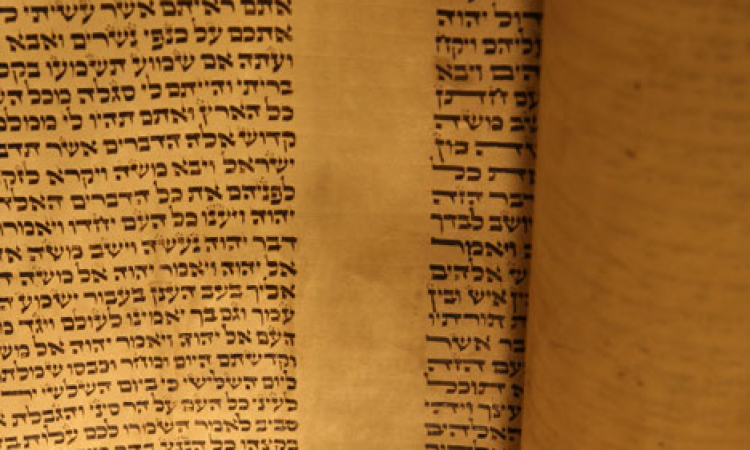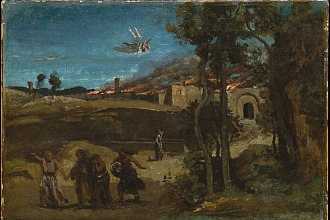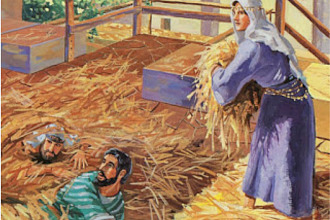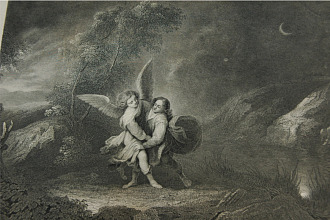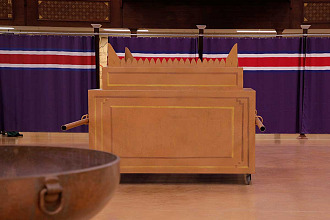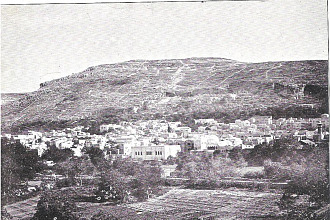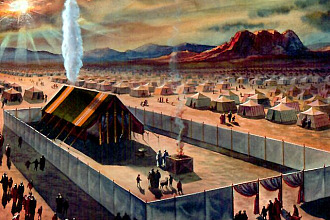Parasha for the Week: Yitro: Exodus 18:1 – 20:23
Haftarah for the Week: Isaiah 6:1 –7:6; 9:5 - 6
Besorat Yeshua: Mark 14:60 - 72
Overview
Hearing of the miracles G-d performed for Bnei Yisrael, Moshe's father-in-law Yitro arrives with Moshe's wife and sons, reuniting the family in the wilderness. Seeing that the only judicial authority for the entire Jewish nation is Moshe himself, Yitro suggests that subsidiary judges be appointed to adjudicate smaller matters, leaving Moshe free to attend to larger issues. Moshe accepts his advice. Bnei Yisrael arrive at Mt. Sinai where G-d offers them the Torah. After they accept, G-d charges Moshe to instruct the people not to approach the mountain and to prepare for three days. On the third day, amidst thunder and lightning, G-d's voice emanates from the smoke-enshrouded mountain and He speaks the Ten Commandments.
"Shabbat a sample of the World to Come"
The fourth commandment of the Ten Commandments which we read in this week's Parsha, Yitro, is the mitzvah of observing Shabbat: "Remember ("Zachor") the Shabbat day, to keep it holy. Six days you shall labor and do all your work. But the seventh day is a Shabbat unto the L-rd your G-d, in it you shall not do any work, you, nor your son, nor your daughter, nor your man-servant, nor your maid-servant, nor your cattle, nor the stranger that is within your gates. For in six days the L-rd made heaven and earth, the sea and all that is in them and rested on the seventh day. Therefore the L-rd blessed the Shabbat day and made it holy." (Ex 20:8-11) Our sages state that the mitzvah of observing Shabbat is equivalent to all other mitzvot of the Torah and one who observes Shabbat is as if he or she fulfilled the entire Torah.
"Honor Your Father and Your Mother"
The fifth commandment, "Honor your father and your mother," is set between the commandment of "Remember the day of Shabbat to keep it holy," and the commandment of "You shall not murder." Why did the Torah place the mitzvah of honoring parents in this order?
The Ten Commandments were given on two connected tablets. The first four on one tablet and the other six on the second tablet. The Ten Commandments are divided into two categories: Commandments between G-d and us ("ben adam lamakom"), the first four, and mitzvot between mankind ("ben adam lachavero"), the last six. According to the Jewish tradition, the fifth commandment of honoring parents fits into both categories. Our sages explain this as follows: There are three partners in the creation of a child; G-d, father and mother. The parents are responsible (also with G-d's help) for the physical part of the child, while G-d gives the "breath of life" (Gen 2:7). When a person honors parents, G-d is honored to be a partner in the child's creation and dwells within the family. However, when one doesn't honor parents, it also displays a lack of honor for G-d too. Therefore, G-d says, "How can I live amongst them." Thus, the mitzvah of honoring parents is placed between the mitzvot between man and G-d, and man and mankind, for it combines both.
The Torah states, "G-d finished on the seventh day the work which He had made..." (Genesis 2:1-2). "How can the Torah say that G-d finished on the seventh day? We know that He rested on the seventh day!" They answer that the seventh day (Shabbat) was when G-d gave the Torah. On the day when G-d gave the Torah, the universe was considered "finished"!
"The Greatest Commandments"
According to our sages, there are 613 mitzvot of the Torah. When People asked Yeshua: "Teacher, which commandment in the law is the greatest?" He answered: You shall love the Lord your God with all your heart, and with all your soul, and with all your mind."
1. I am the L-rd your G-d 41 laws
2. You shall not have any other Gods 56 laws
3. You shall not take the name of the L-rd 14 laws
4. Remember the day of Shabbat 251 laws
"This is the greatest and first commandment. And a second is like it: 'You shall love your neighbor as yourself."
5. Honor your parents 54 laws
6. Don't murder 31 laws
7. Don't commit adultery 65 laws
8. Don't kidnap or don't steal 26 laws
9. Don't testify falsely 35 laws
10. Don't covet 40 laws
613 laws
"On these two commandments hang all the law and the prophets." (Matthew 22:36-40).
"A Perfect Faith"
A young man in the village wanted to go into the textile business to provide for his family. Not being familiar with business dealings, he decided to attend the fair in the big city to see how the ways of commerce are conducted. He went to one of the wholesalers and watched as store retailers entered one after the other to buy material and cloth. He saw the sellers showing the buyers strips of different kinds of materials, in all kinds of quality and colors. After inspecting the material, the buyers and sellers would agree on a price. Then the buyers would hand over quite a large sum to the seller to close the deal. The young man was amazed. Business looked so easy! He decided to do exactly as he had seen the store keepers do. He went and bought various materials, came to his hotel and cut them into many strips. Then he took a table at the fair and spread out his material. He was convinced that it wouldn't take him long to become rich. Merchants approached him, inspected his material and asked for prices. He quoted prices like the other wholesalers. When the potential buyers asked when they can pick up the merchandise, he said, "What merchandise? These strips are the only merchandise I have." Naturally, they laughed at him. "But the other wholesalers also showed you only strips of material?" he asked. They replied, "The strips are only samples of what each wholesaler has to sell. He has hundreds and hundreds of yards of each material in his warehouse. Only a fool would think that all he has were the strips he showed us." The same is with the Ten Commandments and the Torah. For this reason, after the Ten Commandments were given, Moshe stayed on the mountain 40 days, receiving the rest of the Torah, which he then taught to the people Israel.
Haftarah: Isaiah 6:1 – 7:6; 9:5 - 6
Haftarah: The text of the Haftara is a revelation of God to the prophet Isaiah and his calling for the minis¬try: "Then I heard the voice of the Lord saying, "Whom shall I send, and who will go for us?" And I said, "Here am I; send me!" (Isaiah 6:8).
Parasha: In the parasha God revealed himself to the people of Israel: Then the LORD said to Moses, "I am going to come to you in a dense cloud, in order that the people may hear when I speak with you and so trust you ever after." (Exodus 19:9). Miriam was the first prophetess of Israel. God uses men and women to reveal his will to the humanity.
Haftarah: The vision of Isaiah was extraordinary with a great manifestation of the Lord "I saw the Lord sitting on a throne, high and lofty; and the hem of his robe filled the temple. Seraphs were in attendance above him; each had six wings: with two they covered their faces, and with two they covered their feet, and with two they flew. And one called to another and said: "Holy, holy, holy is the LORD of hosts; the whole earth is full of his glory." The pivots on the thresholds shook at the voices of those who called, and the house filled with smoke. " (Is 6:1-4).
Parasha: When the Lord appeared to Israel on the Mount Sinai it was also an extraordinary appearance and with wonderful manifestation: On the morning of the third day there was thunder and lightning, as well as a thick cloud on the mountain, and a blast of a trum¬pet so loud that all the people who were in the camp trembled. Mount Sinai was wrapped in smoke, because the LORD had descended upon it in fire; the smoke went up like the smoke of a kiln, while the whole mountain shook violently. As the blast of the trumpet grew louder and louder, Moses would speak and God would answer him in thunder. (Exodus 19:16; 18, 19)
Besorat Yeshua Mark 14:60 – 72
Besorah: It is the time of Yeshua's trial, the Cohen Hagadol asked him a crucial question: "Again the high priest asked, "Are you the Messiah, the Son of the Blessed One?" (Mark 14:61)
The Cohen Hagadol or High Priest was not a descendant of Aaron, he was a man from the political party of the Sadducees, and paid Rome to receive the charge of High Priest. he was worried about his future and his destiny. If Yeshua is really the Messiah, then he will have to give up all his privilege: Yeshua gives an clear and unambiguous answer: "I am; and 'you will see the Son of Man seated at the right hand of the Power,' and 'coming with the clouds of heaven." (Mark 14:62). During the trial Peter denied he was a disciple of Yeshua. His denying is in parallel with the people of Israel refuse to hear the voice of God in the Sinai.
Parasha: all the people witnessed the thunder and lightning, the sound of the trumpet, and the mountain smoking, they were afraid and trembled and stood at a distance, and said to Moses, "You speak to us, we will listen; but do not let God speak to us, or we will die." (Ex. 20:18-19)

